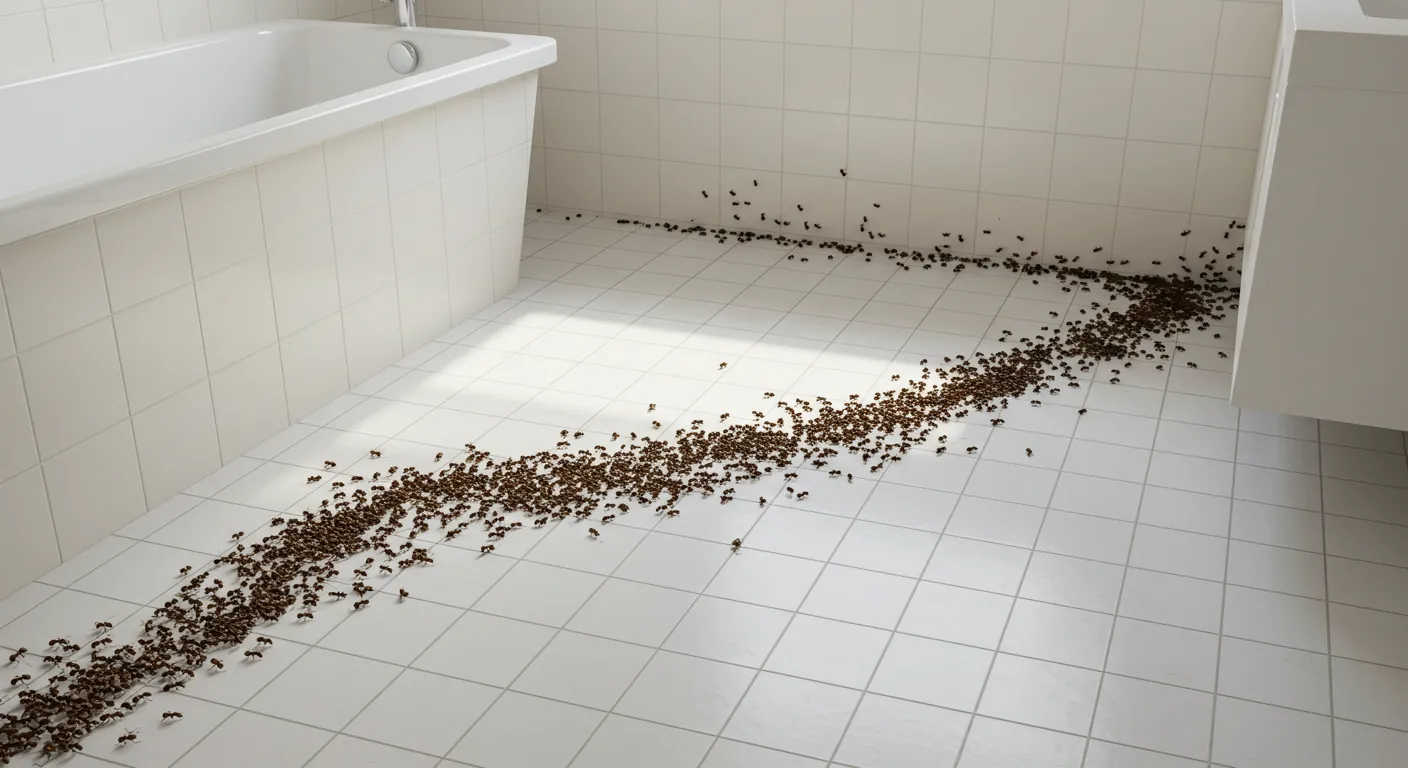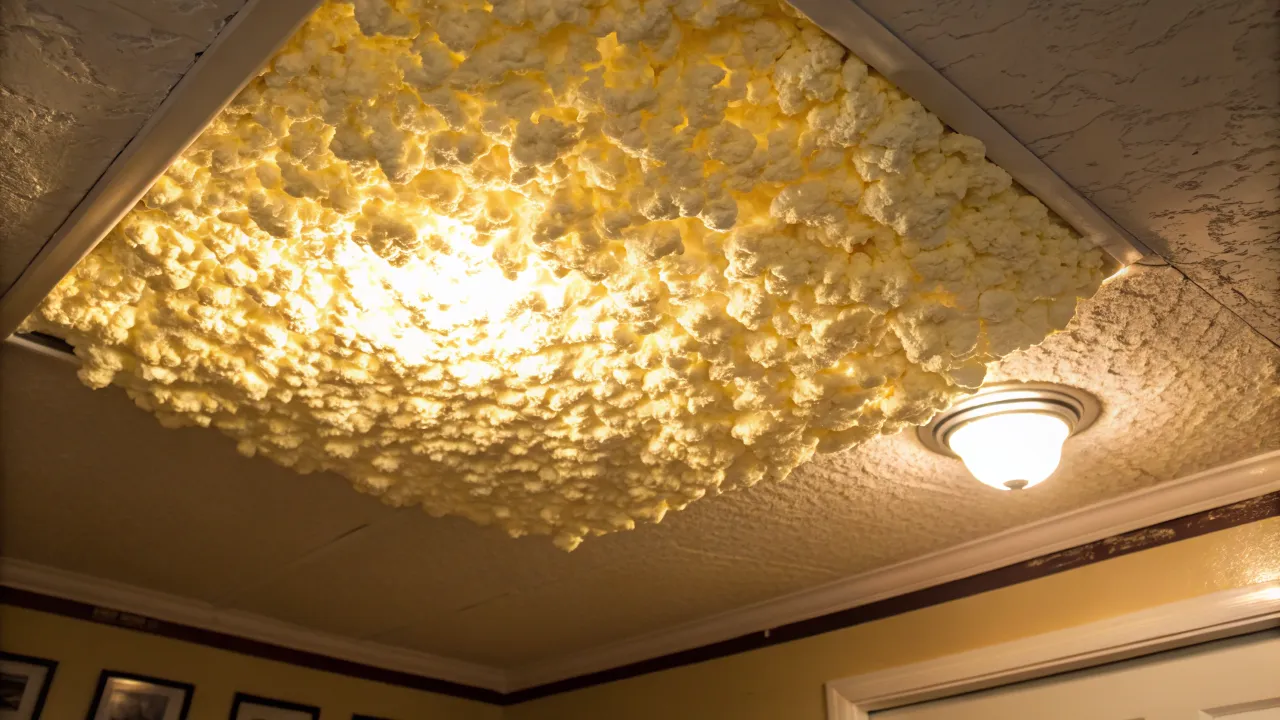Table of Contents
Why Are Ants in Bathroom?
Ants in Bathroom typically enter bathrooms for a combination of three main reasons: moisture, food, and shelter. While bathrooms are not often associated with food, ants can find plenty to feast on in unexpected places.
For example, moisture from leaky pipes or condensation can draw ants in, while soap scum, dead skin cells, and even hair offer them food sources. Ants also seek shelter in cracks and crevices, which many bathrooms provide.
Moisture Is the Main Attraction
The bathroom is a natural haven for moisture, which ants need to survive. Leaky pipes, dripping faucets, and standing water are major culprits that can attract ants to your space.
Carpenter ants, in particular, are drawn to damp environments, especially if there’s decaying wood. In these cases, ants may be looking for both hydration and a place to build their nests.
Unexpected Food Sources
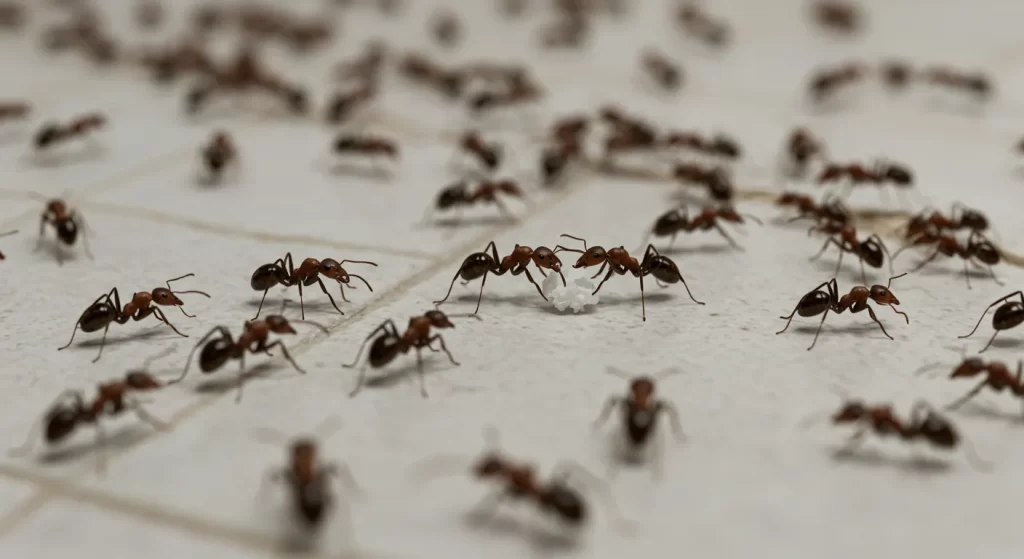
Believe it or not, your Ants in Bathroom may have plenty of food for ants. While you might not see food crumbs like you would in the kitchen, items such as soap scum, hair, dead skin cells, and even residues from toothpaste can serve as a food source for ants. Sweet residues from personal care products can also be tempting for ants. Ants are always on the lookout for food, and they’ll follow the scent trails to find it.
Entry Points and Shelters
Ants in Bathroom often provide perfect places for ants to nest. With so many potential entry points, ants can easily slip through cracks and crevices. Once inside, hidden spaces like wall voids and damp areas behind tiles or cabinets become ideal places for them to nest. The combination of shelter and moisture makes bathrooms appealing to many ant species.
Also Read: How to Get Sticker Residue off Glass: A Comprehensive Guide
How to Eliminate Ants in Your Bathroom
The key to getting rid of ants in your bathroom is addressing the underlying issues that are attracting them. Here’s a breakdown of how to tackle the problem step by step.
Identify the Source of the Ants
The first step is to follow the ant trail. Ants in Bathroom often travel in lines, so tracking where they are coming from can help you identify the entry points. Check for any cracks in the walls, gaps around pipes, or any signs of water damage. It’s also essential to check for leaks, as a dripping faucet or running toilet might be the source of their attraction.
Fix Leaks and Reduce Moisture
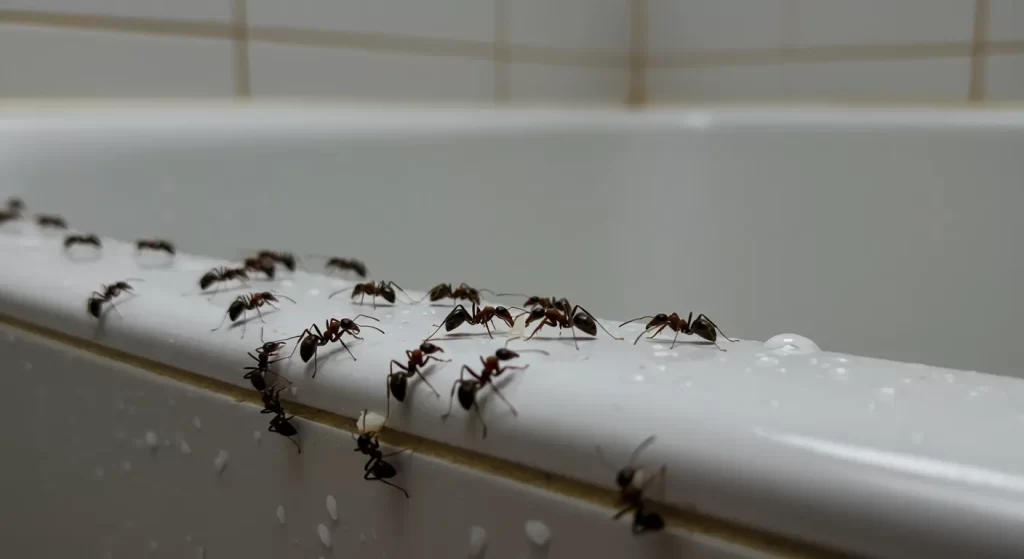
Once you’ve identified any leaks or areas with standing water, it’s time to make repairs. Fixing leaking faucets, showerheads, or pipes will reduce the water supply available to ants. It’s also important to address humidity levels in your bathroom.
Use exhaust fans after taking showers, and wipe down wet surfaces regularly to keep things dry. A dehumidifier may also help if your bathroom tends to stay damp.
Clean Your Bathroom Thoroughly
Ants are opportunistic and will scavenge for food wherever they can find it. Regular cleaning can help remove potential attractants. Be sure to wipe down all surfaces, including counters, sinks, and floors, to remove toothpaste, soap scum, and hair.
Don’t forget to clean out drains as well, as debris can accumulate there and attract ants. Regularly empty trash cans and store personal care products in sealed containers to keep ants at bay.
Also Read: Immediate 0.3 Folex: The Instant Stain Remover That Works Wonders
Use Natural Ant Deterrents
There are several natural remedies that can help repel ants. One of the most effective is vinegar. Simply mix equal parts white vinegar and water in a spray bottle and apply it to ant trails or areas where ants are entering your bathroom. Vinegar disrupts the pheromone trails ants use to communicate, making it harder for them to find food.
Essential oils like peppermint, tea tree, and cinnamon are also great natural deterrents. Ants dislike the strong smells of these oils, which can interfere with their scent trails. You can mix a few drops of these oils with water and spray them around entry points. Diatomaceous earth (DE) is another option. This powder dehydrates ants, killing them without the need for harsh chemicals.
Use Ant Baits and Insecticides
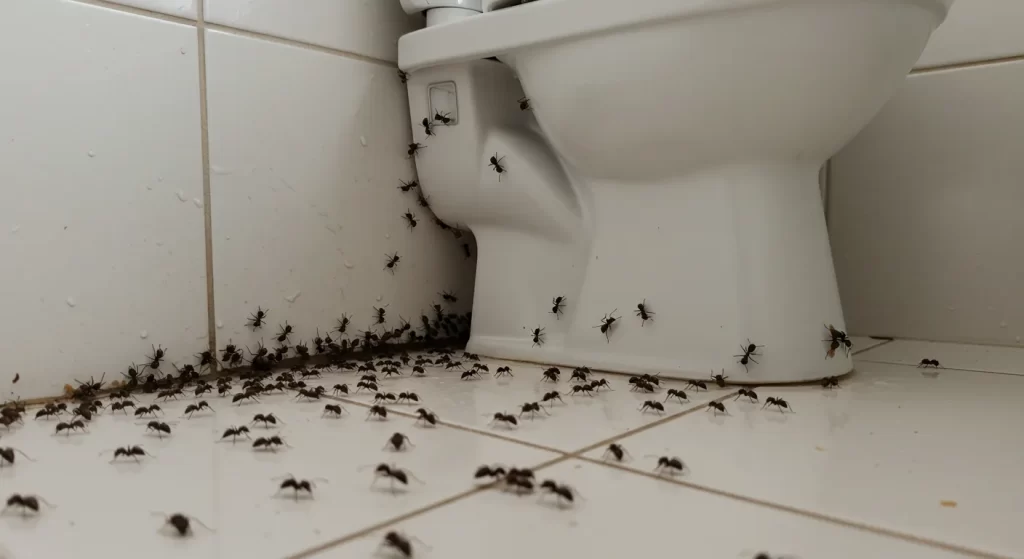
If natural methods don’t work, ant baits can be an effective solution. These baits attract ants, which carry the poison back to their colony, ultimately eliminating the entire nest. Make sure to place the bait along ant trails, but keep it out of reach of pets and children.
For immediate action, indoor-safe insecticide sprays can help kill visible ants. However, insecticides typically only target the ants you see and may not address the root of the infestation.
Seal Entry Points
Once you’ve identified where the ants are coming from, seal any cracks or gaps with caulk. Pay special attention to areas around pipes, windows, and doors. Check the grout lines in your tile and repair any loose tiles. Sealing these entry points will prevent more ants from entering your bathroom in the future.
Also Read: Exploring Picasso Magnetic Tiles: A Fun and Educational Toy for Kids
When to Call a Professional
If you’ve tried everything and the ants keep coming back, it may be time to call in a professional pest control service. Some ant species, such as carpenter ants, can cause significant structural damage if left unchecked. A pest control expert can help identify the species and apply the most effective treatments to eliminate the infestation.
Final Thoughts
While Ants in Bathroom
can be a nuisance, they can usually be dealt with effectively by addressing the key factors attracting them. By reducing moisture, eliminating food sources, and sealing entry points, you can create a less hospitable environment for ants.
If your efforts don’t yield results, consider using ant baits or calling a professional for help. With a little persistence, you can reclaim your bathroom from unwanted visitors and keep it ant-free.
Remember, a combination of cleanliness, moisture control, and sealing entry points is the best strategy for preventing future ant invasions in your bathroom. So next time you spot ants, take action promptly, and they’ll be out of your bathroom before you know it.
FAQs
Why are ants in my bathroom?
Ants are attracted to moisture, food sources like soap scum or hair, and shelter from cracks or hidden spaces in your bathroom, providing an ideal environment for them to thrive.
How can I get rid of ants naturally?
You can use natural remedies like vinegar, essential oils (peppermint or cinnamon), or diatomaceous earth. These disrupt ant trails and repel them without harmful chemicals.
When should I call a pest control professional?
If the ant infestation persists despite your efforts, or if you suspect damage from species like carpenter ants, it’s best to consult a professional pest control service for a thorough solution.

